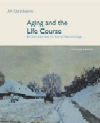

 Aging and The Life Course: An Introduction to Social Gerontology, 2/e Family Relationships and Social Support Systems True or False |
 2002 McGraw-Hill Higher Education
2002 McGraw-Hill Higher EducationAny use is subject to the Terms of Use and Privacy Policy.
McGraw-Hill Higher Education is one of the many fine businesses of The McGraw-Hill Companies.